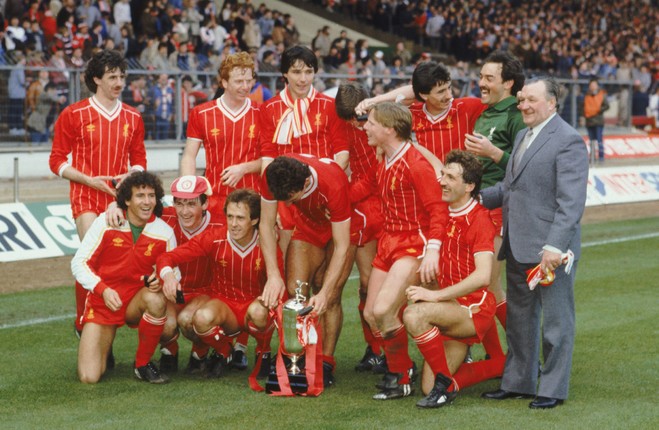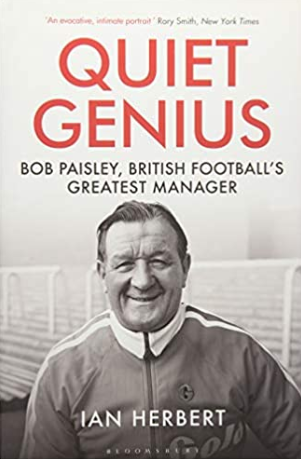THE FOLLOWING PASSAGE is an extract from Quiet Genius: Bob Paisley, British Football’s Greatest Manager by Ian Herbert.
There were moments as the years rolled on when Bob Paisley looked an older man than most other First Division managers. Sometimes he seemed to belong to a different world from those who occupied his stage – Clough, of course, and Manchester United’s ‘Mr Glitter’, Ron Atkinson, who was 20 years younger than him.
Paisley was born when the horrors of World War I were still fresh, had seen the field of conflict through his own eyes, and yet here he now was, working in a place where £1 million would exchange hands for a footballer. Though he still held his players’ professional lives in the palm of his hand, and they looked for the slightest clue as to how he viewed them, there were times when he seemed a slight anachronism.
On one flight to Israel in the early 1980s, Terry McDermott decided to lead a few of the senior players in placing food on the top of the head of a passenger sleeping in the seat in front of them. Mash made it onto the said pate, then carrots and peas. When the victim awoke, he was incandescent.
Paisley, who was in conversation with Peter Robinson and Souness at the time, heard the commotion, saw what had unfolded and leapt to his feet to give the players a piece of his mind. Souness put a hand on the older man’s shoulder and persuaded him that he would intervene to smooth things over.
The world had turned since Paisley had boarded that cruise liner to the United States with Liverpool, 37 years earlier, politely playing deck quoits and speaking to the party of GI brides on board.
But the club was still run in a way alien to many others, which felt like a throwback to simpler, quieter days, when one favour earned another. Bob Rawcliffe, the mechanic and second-hand car dealer, had become a part of the club’s fixtures and fittings, and so had others. They were unobtrusive, uncomplicated working people who gave freely and willingly of their time and were drawn into the Liverpool FC family. They did not come with a sales proposition. They simply had a role to play – sometimes for the Paisley family, as well as for the club. They all looked after their own. They didn’t put food on the heads of sleeping passengers.
Neither did they indulge in some of the other new stunts being practised by Liverpool’s class of 1982–83, such as Bruce Grobbelaar’s ‘fall-down’ routine. This entailed the goalkeeper standing, hands behind his back, before falling straight to the floor whereupon he would get his hands out at the last minute to break his fall ‒ except on the occasion when he left the hand movement a little late, smacked his face on the floor and needed six stitches in his chin.
Paisley’s was a different world from this, occupied by such individuals as ‘Alan the painter’ who would sometimes double as a driver to bring out one of Bob Rawcliffe’s cars to Christine Paisley when she needed one. There was ‘Cyril the insurance’ and ‘Alf Smith the plumber’, who took 11 weeks to install the Paisleys’ central heating and, Jessie recounted, recited poetry in his lunch hours. There was ‘Godfrey the policeman’; ‘Bill and Bob the accountants’. Alf the plumber’s daughter had joined the Paisleys on their trip to Paris for their 1981 family holiday. They received a few tickets here, a club dinner or a trip there, either for themselves or those who were close to them. Liverpool and Paisley had the comfort of knowing that when a problem occurred they would be covered. There would be someone they knew who could help.
Intentionally or otherwise, Paisley could be as much a source of the comedy as ever. A boiled sweet was lodged in his Brylcreemed hair in the press room at Queens Park Rangers but no one liked to point it out.
Not all journalists appreciated that the quiet man was a wise one, with accomplishment meriting respect. Journalist Paul Newman, of The Times, detected after one game at Anfield, where the post-match discussion took place in the back corridor, that a few poked fun at his homespun, rather clichéd way with words.
‘Game of two halves, wouldn’t you say, Bob?’ he was asked, or words to that effect. Paisley either ignored this or was oblivious to it.
By 1982 it had been a little time since he had granted an interview, but to the London listings magazine Time Out he explained very effectively that the days of motivating the players with exploits with magnetic figures on the tactics board had long gone.
Time Out was a curious choice of title for him to speak to, but there was a very Bob Paisley kind of connection. His interviewer, Stan Hey, who would go on to become an accomplished journalist and author, could relate in his letter to the Liverpool manager that his father was a Saturday bet-setter in a betting shop to which Paisley would often adjourn.
‘They’re too old and wise for me to come in and tell them bedtime stories,’ Paisley told Hey. ‘Shank would come in, set up the little figures on the tactics board and say, “You’re playing against a side with Best, Charlton and Cruyff in the forward line,” or whatever, and then he’d sweep the little figures off and put them in his pocket and he’d say, “That’s their forward line gone . . .”
But you can’t do that any more, because the players would just laugh at you. So now I’m glad when someone – the press or another player or manager – has a go at us. I can use that. I’m always picking my brains at home to find something new, searching for the little straws . . .’
The team was on one of the many money-spinning friendlies in the summer of 1982 when Paisley told them that the next season would be his last and he would be calling it a day in a year’s time.
A health problem formed part of the decision, he said, soon after stepping down. It occurred on tour and appears to have been a severe infection of the medial, or middle ear. A ‘virus’ is how Paisley described it. Symptoms of such an infection can include fever, sickness, loss of hearing and loss of balance, and it was the latter which startled Paisley. ‘I was just off balance for a few weeks and at the time it was frightening,’ he said later.
It was a Granada TV documentary presented by none other than Paisley’s old adversary Brian Clough which provided the clearest sense that a health issue might have pushed Paisley towards retiring. ‘I thought, well, you know, if you’re going to be [having problems] like that . . .’ he told the programme’s interviewers, initially trailing off. ‘If you are ruthless enough to change players, then you’ve got to look at yourself and say, “Don’t go beyond your limits.”’
Peter Robinson and the board received no sense from Paisley that health was the motivating factor, though ‒ the pleurisy episode that spring notwithstanding. The manager told Robinson that there were simply other things he wanted to do in his life. A lot of them revolved around horse racing. His achievements had widened his circle of racing friends and, in 1981, he had made his first visit to the Derby with his old accomplice Ray Peers. They travelled by train from Liverpool Lime Street to Epsom station and then walked more than two miles over the Downs to the course together. Paisley was also never happier than at Frankie Carr’s place, at Malton.
Robinson tried to persuade him to stay until the end of the 1983‒84 season, which would have helped the club groom a successor. Paisley was 64 and Liverpool told him they thought he could have gone on for another two years and enjoyed the success of the new young team he had built. He was not to be persuaded this time, though. ‘He was absolutely determined and we could see he was determined,’ says Robinson. ‘He said he wanted to do other things with his life for a year or two.’
Quiet Genius, by Ian Herbert, is published by Bloomsbury. More info here.


